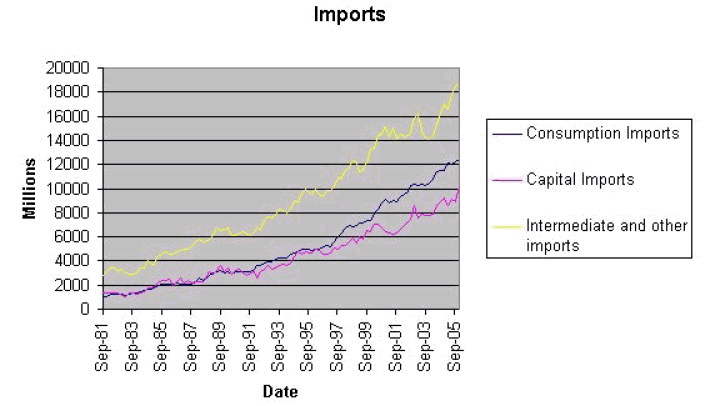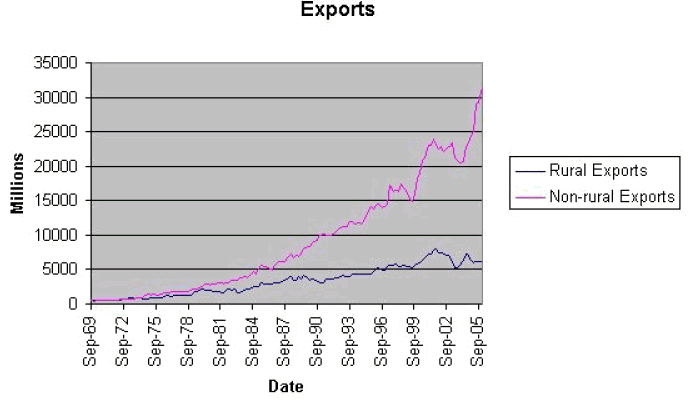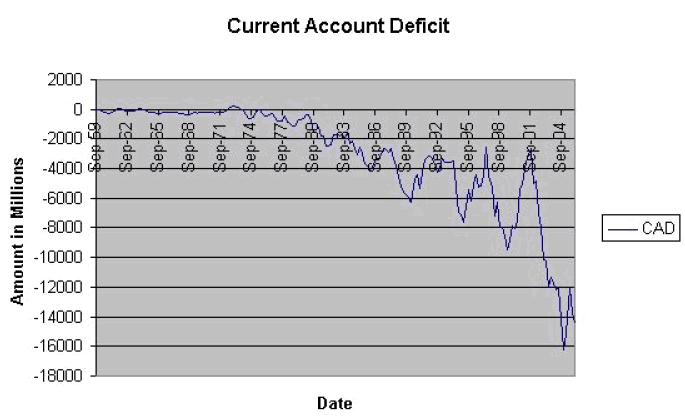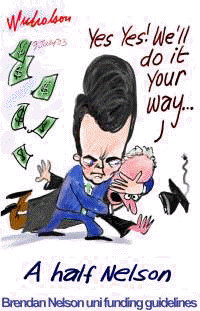|
Editorial-26 April 2006 |
|
|
The silver blonde dropped by the office the other day and began with the comment, "You know, while Brendan Nelson held the reigns of Education, Science and Training he mayn't have been benign, but the universities sure couldn't complain of being neglected."
I had to admit that she had a point but on the other hand, "he'll do significantly less damage to the nation as Defence Minister than as minister for ES&T."
That was met with a "please explain".
"Well, for openers, the defence forces are seen as the good guys, who can be counted on not to make waves, at least not in public (some retired US generals excepted of course) while university students and academics mouth off at any provocation and whinge on and on about insufficient support and resources. And above all they don't see the world properly, in short from a governmental viewpoint, 'why can't they be like us'".
At that point my visitor said she had important matters to attend to, muttering something about chaining herself to one of the blades of a wind farm generator to protect red bellied parrots, and took her leave.
Universities have a habit of reminding anyone who will listen that they are considered by many to be the economic engines of a nation referring to the increased value of the "human capital" and new knowledge they generate. The matter of being a repository of the nation's culture also gets alluded to from time to time, but these days not as much as it used to.
Putting aside the matter of what's the economic value of culture, and focusing on a nation's economic wellbeing the Federal Treasurer, Peter Costello, last week proudly announced that in the ten years since it had resumed government the Coalition had paid off $96 billion of government debt it inherited from the Hawke/Keating government and the Commonwealth Government was now debt free.
On the other hand Australia currently services a foreign debt of half a trillion (500 billion) dollars, which equals approximately 58% of its annual GDP.
As The Age's Kenneth Davidson points out "If it is invested in a way that increases net exports and therefore generates foreign exchange to create a surplus after financing the debt, we all benefit. If not, we all pay."
Using the March spreadsheets from the Australian Bureau of Statistics based on Reserve Bank of Australia figures, cam on http://www.southsearepublic.org/ has produced the following graphs:

"Intermediate and other imports" presumably are imports which consist partially of consumption imports and partially of capital imports, but the relative amounts are not indicated. Overall, however, the proportions are reflected in the Current Account Deficit (see graph below).


The overall accelerating downward trend of the Current Account Deficit ought at least to bring forth a discussion between the political parties but so far not a ripple. Not even the nation's economists have had much to say publicly. However, overall on the world market we buy more than we sell.
In contrast the matter of foreign debt has got Princeton economist Paul Krugman to comment in his New York Times column about the state of play in the United States. He says, "[T]he U.S. trade deficit... according to the broadest measure reached an amazing US$805 billion last year. The mystery is how we've been able to run huge deficits, year after year, with so few visible adverse consequences.
"By rights, then, the investment income — interest payments, stock dividends and so on — that Americans pay to foreigners should be a lot larger than the investment income foreigners pay to Americans. But according to official statistics, the United States still has a slightly positive balance on investment income... almost certainly, is that there's something wrong with the numbers... professional economists know that putting these numbers together involves a lot of educated guesswork — and sometimes the guesses are wrong.
"[Some economists] think the official statistics miss invisible U.S. exports — exports not of goods and services, but of intangibles like knowledge and brand-name recognition, which allow U.S. companies to earn high rates of return on their foreign investments... if we counted [this] 'dark matter,' much of the U.S. trade deficit would disappear.
"But there's a problem: U.S. companies operating abroad don't, in fact, seem to earn especially high rates of return. Why, then, doesn't the United States seem to be paying a price for all its borrowing? Because according to the official data, foreign companies operating in the United States are remarkably unprofitable, earning an average return of only 2.2 percent a year."
But Professor Krugman doesn't believe foreign companies are charitable organisations as regards the US economy and says, "In a new paper, [Daniel] Gros argues — compellingly, in my view — that what's really happening is that foreign companies are understating the profits of their U.S. subsidiaries, probably to avoid taxes, and that official data are, in particular, failing to pick up foreign profits that are reinvested in U.S. operations... the true position of the U.S. economy isn't as bad as you think — it's worse. The true trade deficit, including unreported profits that accrue to foreign companies, isn't US$800 billion — it's more than US$900 billion. And America's foreign debt, including the value of foreign-owned businesses, is at least US$1 trillion bigger than the official numbers say."
And his conclusion about, "'Why haven't we paid a price for our trade deficit?' is, just you wait."
How relevant is Paul Krugman's analysis to Australia's situation - well, we really don't know, or the Australian public isn't being told, but in any case it's about time we were.
Secondly, if the analysis is pertinent, somewhere along the line the piper will needs be paid, or Paul Keating's infamous vision of a "banana republic" mayn't be far off the mark.
And matters won't be helped by grinding the nation's "economic engine" under a political heel and micromanaging the sector -- or continuing to place disincentives in the way of private sector applied research and development.
Alex Reisner
The Funneled Web
